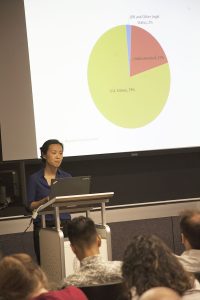Dornsife panel examines immigration
Four USC professors discussed immigration and the implications of current rhetoric on the issue for immigrants in a panel hosted by USC Dornsife on Friday.

Alexandra Ting | Daily Trojan
Tear down that wall · Assistant Professor at the USC Gould School of Law Emily Ryo argued against Donald Trump’s immigration plan.
The panel, part of the Fall 2016 USC Dornsife Thematic Semester program, featured Sol Price School of Public Policy Professor Dowell Myers, Dornsife College Professor Manuel Pastor, Gould School of Law Associate Professor Emily Ryo and Annenberg School of Communication and Journalism Professor Roberto Suro. It was open to students and staff alike and was held in the Mark Taper Hall of Humanities.
The USC Dornsife Thematic Semester program is a series of panels each week discussing a different aspect of law and politics. Its goal is to educate students on the facts and figures behind government actions and policies. The current program theme is Electoral Commons, which features weekly panels pertaining to the presidential election.
“My hope is that this panel is a starting point for students to really think about these issues of immigration, specifically how it pertains to the upcoming election,” Ryo said. “An hour is not long enough to give a nuanced understanding of the whole issue, but it will be enough to get students to start thinking more critically about the election as a whole.”
The four professors took six minutes each to focus on one aspect of the immigration issue and concluded the panel with a 30-minute question-and-answer session. Some of the topics discussed included the potential enforcement of Republican Party Nominee Donald Trump’s proposed wall, the economic ramifications of mass deportation, the process of naturalization and the public opinion on immigration.
As to why immigration is a topic USC students should better understand in the upcoming election, Ryo stated that it was an issue of personal importance.
“We have 11.3 million undocumented immigrants. But that’s not counting legal immigrants, many of whom are making up a huge segment of our working population. These legal immigrants are our neighbors, our friends. They’re in our own school — they’re not a separate population, but they’re part of our own lives,” Ryo said. “As these people impact our personal lives and networks, this issue should be something of personal interest to students.”
For Myers, the public discussion about immigration has become less about the issue and more about political power.
“I think immigration is a sideshow in this election because it’s been turned into an attention-getter by the losing candidate — but we don’t actually know what his real policies are,” Myers said. “For immigration especially, it’s important for USC students to understand this issue because they read about it in the newspaper and hear the campaign rhetoric, and it’s not enough to inform them. They need hard data to better see through the smoke screens in this election.”
Kurt Weatherford, a freshman majoring in international relations and the global economy, Weatherford commented on the importance of such programs.
“I thought it was amazing to be in the presence of such knowledgeable faculty that I don’t think would be available in a lot of spaces, but at USC, it’s nice to have access to this,” Weatherford said.
Following the panel, several students and staff members raised questions of their own to gain a better knowledge on topics of their specific interest; some included the legal protections illegal immigrants have against workplace abuse, the details of presidential candidate Hillary Clinton’s “comprehensive immigration reform” policy, what might happen to immigrant-heavy sectors without immigrant workers and the outlook on the U.S. population in the next two decades.
“As far as who I’m going to vote for, this panel didn’t change my views, but it did change my viewpoint in the sense that I became more educated on the issue of immigration in specific,” Weatherford said. “It also allowed me to understand a different perspective of the election.”
